译林高二上 译林选修六Unit3重点词汇讲解和练习(含答案)
高中英语(牛津译林版)选修六配套文档Unit 3 Period One Word版含答案
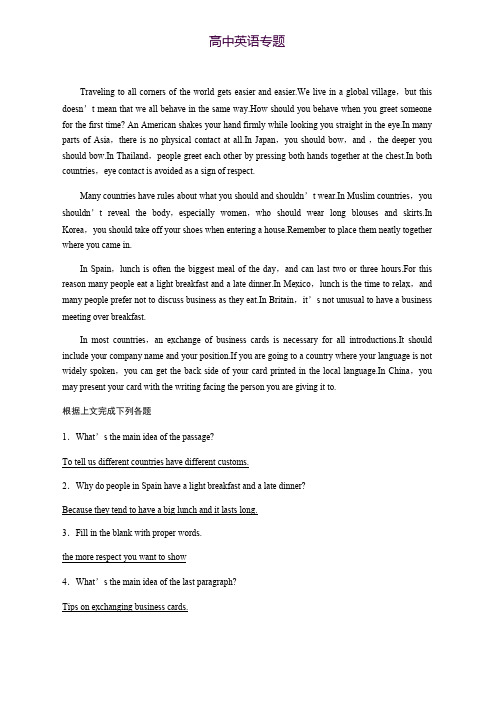
Traveling to all corners of the world gets easier and easier.We live in a global village,but this doesn’t mean that we all behave in the same way.How should you behave when you greet someone for the first time? An American shakes your hand firmly while looking you straight in the eye.In many parts of Asia,there is no physical contact at all.In Japan,you should bow,and ,the deeper you should bow.In Thailand,people greet each other by pressing both hands together at the chest.In both countries,eye contact is avoided as a sign of respect.Many countries have rules about what you should and shouldn’t wear.In Muslim countries,you shouldn’t reveal the body,especially women,who should wear long blouses and skirts.In Korea,you should take off your shoes when entering a house.Remember to place them neatly together where you came in.In Spain,lunch is often the biggest meal of the day,and can last two or three hours.For this reason many people eat a light breakfast and a late dinner.In Mexico,lunch is the time to relax,and many people prefer not to discuss business as they eat.In Britain,it’s not unusual to have a business meeting over breakfast.In most countries,an exchange of business cards is necessary for all introductions.It should include your company name and your position.If you are going to a country where your language is not widely spoken,you can get the back side of your card printed in the local language.In China,you may present your card with the writing facing the person you are giving it to.根据上文完成下列各题1.What’s the main idea of the passage?To tell us different countries have different customs.2.Why do people in Spain have a light breakfast and a late dinner?Because they tend to have a big lunch and it lasts long.3.Fill in the blank with proper words.the more respect you want to show4.What’s the main idea of the last paragraph?Tips on exchanging business cards.Period OneWelcome to the unit & ReadingⅠ.重点单词1.greet v t.和某人打招呼(或问好)2. ensure v t.保证,担保,确保3.congratulate v t.向(某人)道贺,祝贺4.reception n.接待;接受;招待会5.permit v t.&v i.允许,准许;n.许可证permission n.允许6.prohibit v t.(尤指以法令)禁止7.throughout prep.&ad v.自始至终;贯穿整个时期;各处,遍及8.offence n.冒犯;侮辱offend v t.冒犯offensive adj.冒犯的9.adjust v i.&v t.适应,习惯;调整,调节adjustment n.调整10.accustomed adj.习惯于;惯常的accustom v t.使习惯于11.alike adj.相像,十分相似;ad v.十分相像地;同样地12.familiar adj.熟悉的;通晓的13.celebration n.庆祝活动;庆典celebrate v t.庆祝Ⅱ.重点短语1. as soon as一……就……2.be supposed to应该3. have trouble/difficulty (in) doing sth.做某事有困难4.get accustomed to (doing) sth.习惯于(做)某事;适应某事5.be familiar with熟悉,通晓6.take place发生7.after all 毕竟;终究8.on the other hand另一方面9.do without没有……也行;将就Ⅲ.重点句式1.it作形式主语,动名词为真正的主语It’s quite funny watching the new foreign teachers trying to adjust to doing that.看新来的外教努力适应这个动作的样子很有趣。
牛津译林高中英语选修六Unit3单元复习

Part 1 词汇复习
1. 根据挎号内要求转变形式 expect-- _e_x_p_e_c_ta_t_i_o_n (n.)
expect (sb.) to do; it is expected that; than/as expected; out of expectation
联想 except--__e_x_c_e_p_ti_o_n____(n.); explain-- _e_x_p_l_a_n_a_ti_o_n_____ (n.) familiar -- _fa_m__i_li_a_r_it_y__(n.) be familiar with sth. ; be familiar to sb. 联想-- _si_m__il_a_r (相似的)-- _si_m__il_a_r_it_y_ (n.) Korea-- _K_o_r_e_a_n_______ (n.)
–平躺;位于;存在于_l_ie_ -- _la_y___ (过去式)-- _l_a_in___ (过去分词) –下蛋;下岗;布置布局__la_y__ -- __l_a_id_ (过去式)-- _la_i_d_ (过去分词) (11) the person concerned _相__关__人__员___________ ;
Put the letter where you take it. _状__从________ Put the letter to the place where you take it.___定__从______ This place is where you take the letter._表__从________ Where you take the letter is not known._主__从________ Who can answer the question where you take the letter? __同__位__从______
高中英语(牛津译林版)选修六配套文档:Unit 3 Period Three Word版含答案
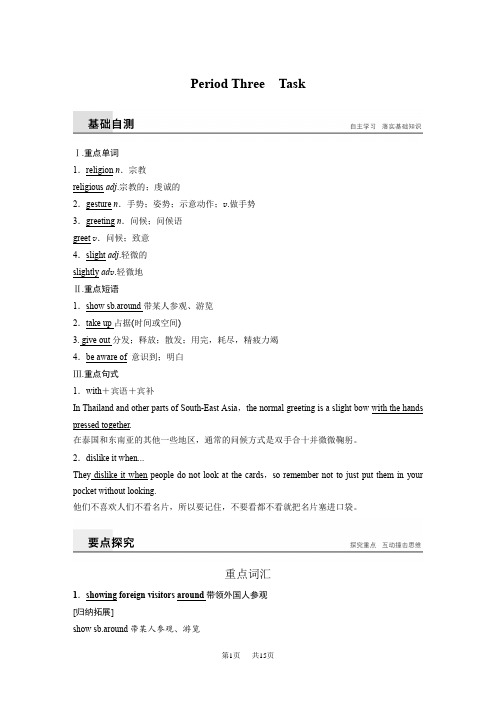
Period Three TaskⅠ.重点单词1.religion n.宗教religious adj.宗教的;虔诚的2.gesture n.手势;姿势;示意动作;v.做手势3.greeting n.问候;问候语greet v.问候;致意4.slight adj.轻微的slightly ad v.轻微地Ⅱ.重点短语1.show sb.around带某人参观、游览2.take up占据(时间或空间)3. give out分发;释放;散发;用完,耗尽,精疲力竭4.be aware of 意识到;明白Ⅲ.重点句式1.with+宾语+宾补In Thailand and other parts of SouthEast Asia,the normal greeting is a slight bow with the hands pressed together.在泰国和东南亚的其他一些地区,通常的问候方式是双手合十并微微鞠躬。
2.dislike it when...They dislike it when people do not look at the cards,so remember not to just put them in your pocket without looking.他们不喜欢人们不看名片,所以要记住,不要看都不看就把名片塞进口袋。
重点词汇1.showing foreign visitors around带领外国人参观[归纳拓展]show sb.around带某人参观、游览show off炫耀show up露面show sb.in/out带某人进来/出去[语境助记](1)They sent someone to show me around the new office.他们派人带我到新办公室看了看。
(2)The girl is always showing off her new clothes.这个女孩总是炫耀她的新衣服。
高二英语译林版选修6教学案Unit 3 Section 2 Word版含答案
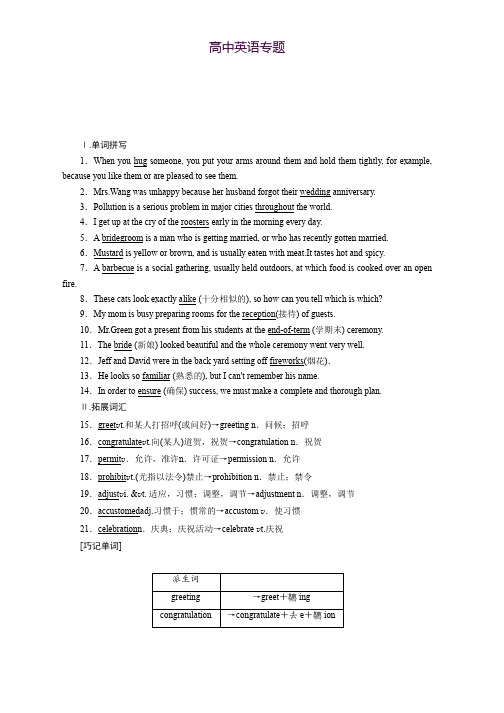
Ⅰ.单词拼写1.When you hug someone, you put your arms around them and hold them tightly, for example, because you like them or are pleased to see them.2.Mrs.Wang was unhappy because her husband forgot their wedding anniversary.3.Pollution is a serious problem in major cities throughout the world.4.I get up at the cry of the roosters early in the morning every day.5.A bridegroom is a man who is getting married, or who has recently gotten married.6.Mustard is yellow or brown, and is usually eaten with meat.It tastes hot and spicy.7.A barbecue is a social gathering, usually held outdoors, at which food is cooked over an open fire.8.These cats look exactly alike (十分相似的), so how can you tell which is which?9.My mom is busy preparing rooms for the reception(接待) of guests.10.Mr.Green got a present from his students at the end-of-term (学期末) ceremony.11.The bride (新娘) looked beautiful and the whole ceremony went very well.12.Jeff and David were in the back yard setting off fireworks(烟花).13.He looks so familiar (熟悉的), but I can't remember his name.14.In order to ensure (确保) success, we must make a complete and thorough plan.Ⅱ.拓展词汇15.greet v t.和某人打招呼(或问好)→greeting n.问候;招呼16.congratulate v t.向(某人)道贺,祝贺→congratulation n.祝贺17.permit v.允许,准许n.许可证→permission n.允许18.prohibit v t.(尤指以法令)禁止→prohibition n.禁止;禁令19.adjust v i. &v t. 适应,习惯;调整,调节→adjustment n.调整,调节20.accustomed adj.习惯于;惯常的→accustom v.使习惯21.celebration n.庆典;庆祝活动→celebrate v t.庆祝[巧记单词]→greet+ing→congratulate+去e+ion→adjust+mentⅢ.补全短语1.adjust to 适应2.get/be/become accustomed to习惯于3.be familiar with通晓;熟悉4.be amazed at对……感到吃惊5.take off脱下,除掉;起飞6.be similar to与……相似7.on the one hand 一方面8.do without设法对付过去;没有……也行9.share/have sth. in common 有共同点10.set off燃放1.[教材原句]Roosters are supposed to drive bad spirits away from the wedding ceremony, and hens are thought to ensure good luck for the marriage.公鸡被认为能够把坏运气从婚礼上赶走,而母鸡被认为能保证给婚姻带来好运。
高二英语译林版选修6教案:Unit3 power 含解析 精品
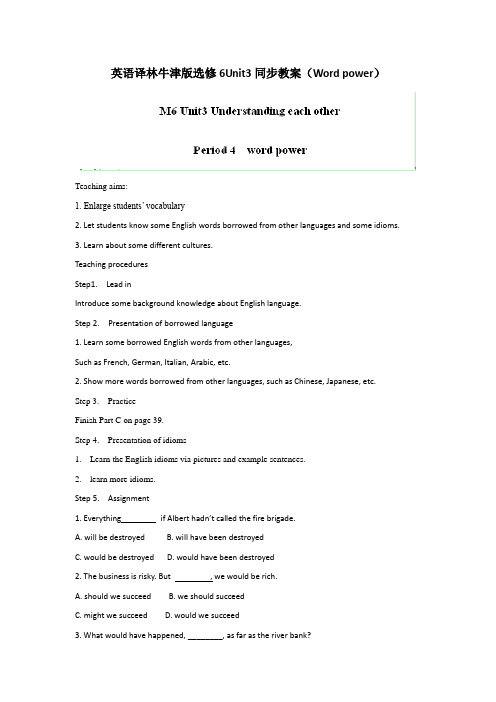
英语译林牛津版选修6Unit3同步教案(Word power)Teaching aims:1. Enlarge students’ vocabulary2. Let students know some English words borrowed from other languages and some idioms.3. Learn about some different cultures.Teaching proceduresStep1. Lead inIntroduce some background knowledge about English language.Step 2. Presentation of borrowed language1. Learn some borrowed English words from other languages,Such as French, German, Italian, Arabic, etc.2. Show more words borrowed from other languages, such as Chinese, Japanese, etc.Step 3. PracticeFinish Part C on page 39.Step 4. Presentation of idioms1.Learn the English idioms via pictures and example sentences.2.learn more idioms.Step 5. Assignment1. Everything if Albert hadn’t called the f ire brigade.A. will be destroyedB. will have been destroyedC. would be destroyedD. would have been destroyed2. The business is risky. But , we would be rich.A. should we succeedB. we should succeedC. might we succeedD. would we succeed3. What would have happened, ________, as far as the river bank?A. Bob had walked fartherB. if Bob should walk fartherC. had Bob walked fartherD. if Bob walked farther4. I _____ you some money, but I hadn’t any on me then.A. would lendB. would have lentC. could lendD. may have lent5. ______ today, he would get there by Friday.A. Was he leavingB. if he leavesC. Were he to leaveD. if he is leaving6. Supposing this ship ,do you think there would be enough life jackets for all the passengers?A. were to sinkB. has sunkC. was sinkingD. sunk7. I don’t think he’ll attend the party, and ______ he attend it, what would he wear?A. wereB. hadC. didD. should8. —— My boss often made me work day and night.—— If I _____ you, I ______ the job.A. am, will give upB. had been, would have given upC. were, would give upD. had been, would give up9. —— You can ask your brother for help.——He isn’t at home. If he _____, I ______.A. were, wouldB. is, wouldC. is, willD. were, will10. —— Are you thinking about going to Dalian for the vacation?—— No, but if I ________ time, I _________ very glad to go there.A. have, will beB. had had, would have beenC. had, would beD. had had, would be11. ——Sally finally got here from Chicago.—— If she_______ earlier, we ______ her to the party then.A. came, would takeB. had come, would have takenC. comes, will takeD. had come, would take。
【译林牛津版】英语选修六:Unit3重点词汇讲解和练习(含答案)
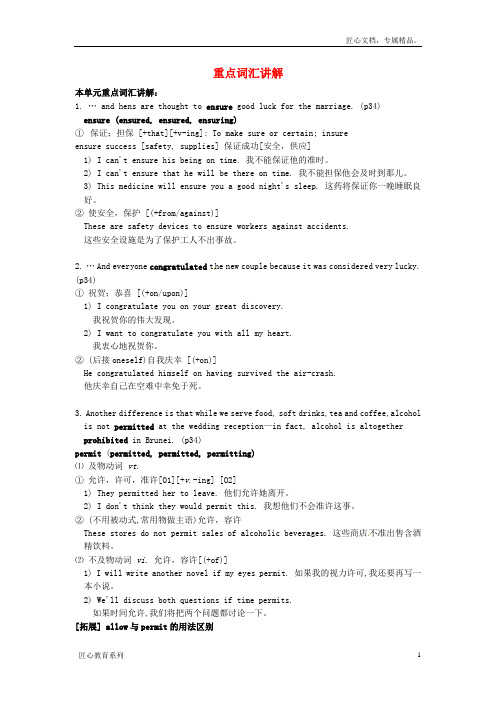
重点词汇讲解本单元重点词汇讲解:1. … and hens are thought to ensure good luck for the marriage. (p34)ensure (ensured, ensured, ensuring)①保证;担保 [+that][+v-ing]: To make sure or certain; insureensure success [safety, supplies] 保证成功[安全,供应]1) I can't ensure his being on time. 我不能保证他的准时。
2) I can't ensure that he will be there on time. 我不能担保他会及时到那儿。
3) This medicine will ensure you a good night's sleep. 这药将保证你一晚睡眠良好。
②使安全,保护 [(+from/against)]These are safety devices to ensure workers against accidents.这些安全设施是为了保护工人不出事故。
2. …And everyone congratulated t he new couple because it was considered very lucky. (p34)①祝贺;恭喜 [(+on/upon)]1) I congratulate you on your great discovery.我祝贺你的伟大发现。
2) I want to congratulate you with all my heart.我衷心地祝贺你。
② (后接oneself)自我庆幸 [(+on)]He congratulated himself on having survived the air-crash.他庆幸自己在空难中幸免于死。
高中英语(牛津译林版)选修六配套文档Unit 3 Period Two Word版含答案
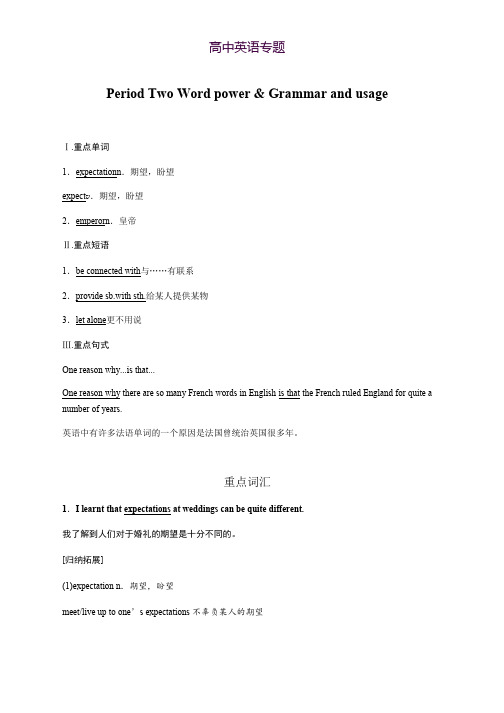
Period Two Word power & Grammar and usageⅠ.重点单词1.expectation n.期望,盼望expect v.期望,盼望2.emperor n.皇帝Ⅱ.重点短语1.be connected with与……有联系2.provide sb.with sth.给某人提供某物3.let alone更不用说Ⅲ.重点句式One reason why...is that...One reason why there are so many French words in English is that the French ruled England for quite a number of years.英语中有许多法语单词的一个原因是法国曾统治英国很多年。
重点词汇1.I learnt that expectations at weddings can be quite different.我了解到人们对于婚礼的期望是十分不同的。
[归纳拓展](1)expectation n.期望,盼望meet/live up to one’s expectations不辜负某人的期望beyond expectations料想不到beyond one’s expectation 出乎某人的意料(2)expect sb.to do sth.期望某人做某事[语境助记](1)This computer will certainly live up to all your expectations if you buy it,sir.先生,如果你买下这台电脑,它一定不会让你失望的。
(2)The Spring Festival didn’t turn out as exciting,which was beyond our expectation.春节没有来得那么令人激动,这是我们所没有料想到的。
高中英语译林选修6课:Unit3SectionⅢ WordpowerGrammarandusage

(1)connect vt.&vi. connect..Байду номын сангаасto/with... connect with (2)connection n. have a connection with have no connection with/to in connection with
连接;联系;关联 把……和……联系起来/连接起来 衔接;与……有联系 联系;关系 与……有关系 与……无关系 关于;与……有关
虚拟语气(Ⅰ)
阅读下列句子,体会黑体部分的用法 1.If I were you,I should try my best to go to college. 2.Were I you,I should try my best to go to college.
3.If he had gone to the party last night,everything would have changed. 4.Had he gone to the party last night,everything would have changed. 5.If it were to be sunny tomorrow,we would go out for a picnic. 6.Were it to be sunny tomorrow,we would go out for a picnic.
理 基 础
巧 突 破
Section Ⅲ Word power & Grammar and usage
全
精
部
剖
析
析
根据提示写出下列单词
1.
n.
期望,盼望
2.
n.
- 1、下载文档前请自行甄别文档内容的完整性,平台不提供额外的编辑、内容补充、找答案等附加服务。
- 2、"仅部分预览"的文档,不可在线预览部分如存在完整性等问题,可反馈申请退款(可完整预览的文档不适用该条件!)。
- 3、如文档侵犯您的权益,请联系客服反馈,我们会尽快为您处理(人工客服工作时间:9:00-18:30)。
重点词汇讲解本单元重点词汇讲解:1. … and hens are thought to ensure good luck for the marriage. (p34)ensure (ensured, ensured, ensuring)①保证;担保 [+that][+v-ing]: To make sure or certain; insureensure success [safety, supplies] 保证成功[安全,供应]1) I can't ensure his being on time. 我不能保证他的准时。
2) I can't ensure that he will be there on time. 我不能担保他会及时到那儿。
3) This medicine will ensure you a good night's sleep. 这药将保证你一晚睡眠良好。
②使安全,保护 [(+from/against)]These are safety devices to ensure workers against accidents.这些安全设施是为了保护工人不出事故。
2. … And everyone congratulated t he new couple because it was considered very lucky. (p34)①祝贺;恭喜 [(+on/upon)]1) I congratulate you on your great discovery.我祝贺你的伟大发现。
2) I want to congratulate you with all my heart.我衷心地祝贺你。
② (后接oneself)自我庆幸 [(+on)]He congratulated himself on having survived the air-crash.他庆幸自己在空难中幸免于死。
3. Another difference is that while we serve food, soft drinks,tea and coffee,alcohol is not permitted at the wedding reception—in fact, alcohol is altogether prohibited in Brunei. (p34)permit (permitted, permitted, permitting)⑴及物动词vt.①允许,许可,准许[O1][+v.-ing] [O2]1) They permitted her to leave. 他们允许她离开。
2) I don't think they would permit this. 我想他们不会准许这事。
② (不用被动式,常用物做主语)允许,容许These stores do not permit sales of alcoholic beverages. 这些商店不准出售含酒精饮料。
⑵不及物动词vi. 允许,容许[(+of)]1) I will write another novel if my eyes permit. 如果我的视力许可,我还要再写一本小说。
2) We'll discuss both questions if time permits.如果时间允许,我们将把两个问题都讨论一下。
[拓展] allow与permit的用法区别(1) 两者均可表示“允许”,其区别是 permit 通常指上级、规则或法令等表示的准许,其语气较重;而 allow 通常指消极地不加反对,有时含有听任或默许之意,语气较轻。
如: 1) Nothing is permitted; everything is allowed.一切都没明文规定可以做,但一切做了也无妨。
2) The nurse allowed him to remain there,though it was not permitted.护士让他留在那儿,而按规定那是不许可的。
(2) 从用法上看,两者后接动词作宾语时,均要用动名词形式,而不能用不定式。
如: 1) We don’t allow [permit] swimming in the pool.我们不许在池子里游泳。
但是若其后接有名词或代词,那么其后须接不定式。
如:2) We don’t allow [permit] children to swim in the pool.我们不许孩子们在池子里游泳。
prohibit vt. (prohibited,prohibited,prohibiting) prohibit sb. from doing sth.① (以法令,规定等)禁止[(+from)]Smoking is prohibited in the office building.办公楼内禁止抽烟。
②妨碍,阻止;使不可能[(+from)][+v-ing]The high cost of the machine prohibits its widespread[拓展] prohibit,ban,forbid的用法区别ban n/.vt .“禁止,禁令”(=formal prohibition),指合法地或由于社会压力而禁止,含谴责或不赞成的态度,通常搭配形式:ban ... from sth./doing sth.。
forbid vt.“禁止,不许”,普通用语,比prohibit通俗,用于较小事物,或个人、上级、官方、长辈做出的禁止命令、规定,或客观条件不允许,通常搭配形式:forbid sb.to do sth.。
prohibit vt.“禁止,不准”(=forbid by authority),指通过法律、法令、警告等作出禁止命令的规定或规则,通常搭配形式:prohibit sb. from sth/doing sth.。
4. In Brunei that can cause offence, so we use our thu mb to point.offence n.犯罪,冒犯,违反,罪过,过错n. [军] 攻击习惯用语an offence against 违反 commit an offence against 违反;破坏5. It’s quite funny watching the new foreign teachers trying to adjust to doing that.adjust vt.①调节;改变……以适应[(+to)]She must learn to adjust herself to English life.她必须学会适应英国的生活。
②校正;校准;调整I must adjust my watch, it's fast.我的表快了,我得把它校准。
vi.①调整;校准②适应[(+to)]Astronauts in flight must adjust to weightlessness.宇航员在飞行中必须适应失重状态。
[拓展] adjust和adapt的区别:adjust:(1) 及物动词vt. :调节,使……适合,校准adjust a radio (dial) 调准收音机的选台指针adjust color on a TV 调整电视的色彩adjust one's tie in a mirror 照镜子整理领带(2) 及物动词 vt.使……适合[于……][to]adjust a telescope to one's eye 调节望远镜使之适合眼睛观看(3) 及物动词vt. 调整<机器> adjust a clock 调准时钟adapt:及物动词 vt. :(改装)使适合,改编。
make to fit in a new place; make fit for He adapted his old car engine to the boat.他把他的旧汽车上的引擎用到那只船上。
adapt sth. for a particular use 使某物适合某一特殊用途当表示:改变……适应环境时adjust和adapt则差不多。
常跟to 搭配。
1) The body adjusts itself to changes of temperature. 身体会自行适应温度的变化。
2) You must adjust yourself to new conditions. 你必须使自己适应新的环境。
3) He soo n adjusted to army life. 他很快就适应了军队生活。
adapt oneself to a new job 使自己适应新的工作adapt one's thinking to the new situation 使思想适应新形势6. Many foreigners have trouble getting accustomed to it.·惯常的This is his accustomed hour to go to bed.这是他就寝的惯常时间。
·习惯于……的1) They are accustomed to this sort of work.他们惯于干这种工作。
2) We have got accustomed to living in an air-conditioned room.我们对生活在有空调的房间里已习惯了。
3) I'm not accustomed to getting up so early to do morning exercise.我不习惯这么早起床进行晨练。
7. … our customs are not always alike.形容词作表语或后置定语,相象的The twins look very much alike.这对双胞胎看上去非常相像。
[拓展]look like 是“看上去像,像……,似……,外貌特征是……”1) Doesn't she look like her father?2) No matter what the results of the homemade gift look like, remember it's the thought that counts.look alike 的主语是俩个事物或人,不接宾语。
意思是他们看起来相似。
Eg. A and B look alike.l ook like 也是俩事物或人指看起来像。
